#excellent meta
Text

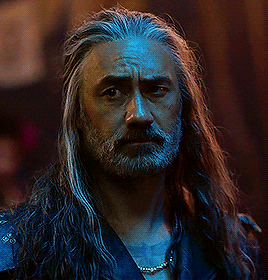
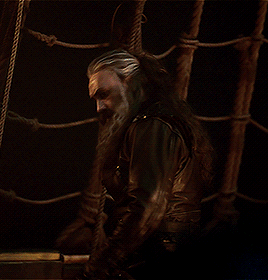
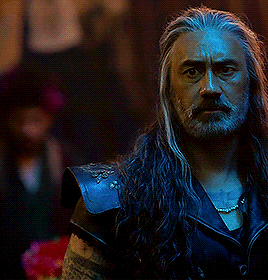



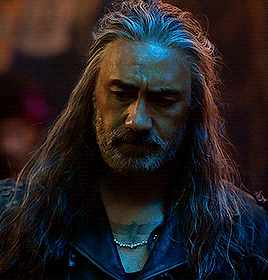
something something Ed not being able to step in to protect Stede from physical and emotional harm out of fear of damaging Stede's reputation and instead letting it play out as he silently falls apart in the background
#our flag means death#ofmd#ofmdedit#ofmd s2 spoilers#edward teach#blackbeard#blackbonnet#gentlebeard#taika waititi#there's an excellent meta on this in my head but unfortunately i don't know how to write#if anyone understands what i mean here please put my thoughts to words#my stuff
3K notes
·
View notes
Text
In middle school, I read a short story for English class called Flowers for Algernon. Maybe you’ve read it, too. In the story, a disabled man named Charlie is given a medicine that cures his disability. Over the course of the story, he comes to realize that his “cure” is temporary and that he will “regress” into being disabled again. The story makes it clear that this is a tragedy. As a disabled teenager when I first read it, the story affected me deeply.
I’d like to talk about David and Noelle.
Content warnings for discussion of suicide, self-harm, ableism and eating disorders below the cut. Spoilers for Worm through arc 27.
When I was first reading arc 18, one of the things that stuck out to me is how much time the story spends on Eidolon. For me, it was the first time I paid much attention to him - prior to that, Eidolon was just an extremely powerful background character to me. But in arc 18, we learn that (1) Eidolon is losing his powers and (2) he believes that fighting Echidna will allow him to tap into some sort of reservoir to bring them back.
We find this out, of course, through Tattletale exposing him, which is always an extremely embarrassing event for Tattletale’s target. It makes it extremely clear that what Eidolon is doing is pathetic. He is going to kill a teenage girl so he can feel something.
Which would be messed up enough, right? We don’t need to make this even worse, right? Wrong. Because Wildblow has spent the last several thousand words building up the Case 53s as X-Men style metaphors for oppressed groups, and one of the forms of oppression that Wildblow generally writes well is ableism. I think you can consider most, if not all of the Case 53s as disabled in some way. I think the link is extremely clear with Noelle.
Noelle doesn’t get her powers from traditional Cauldron human experimentation - at least, not directly. Instead, she and Krouse are facing what is, to them, a no-win scenario. They’re quarantined with limited access to medical care. Breaching this quarantine would permanently render them criminals. If Noelle survives her surgery, which is a pretty big if, she’ll become disabled, in a way that both Krouse and Noelle agree is ugly and undesirable. She won’t be able to do “boyfriend-girlfriend stuff” because she won’t be “any good to look at, after.”
Krouse and Noelle are terrified of death, yes, but they’re also terrified of disability. They are desperate for control over Noelle’s body, control that, as of that moment, only the state has. (Remember the quarantine?) Krouse pressures Noelle into drinking the vial. Noelle is cured.
Noelle’s cure does not last. In attempting to assert control, her body becomes uncontrollable. Her body is her trauma and her eating disorder made literal. She still needs care.
Worm would be bad if this is why her life sucks. But Worm does something better, instead. Noelle goes through hell, not just due to the sheer difficulty of having her power, but because of the way her teammates and Coil treat her. They talk about Noelle like she’s already dead. They’re ashamed of bringing her the food she needs. When Krouse “includes” Noelle in a discussion in arc 12, it’s mostly perfunctory. They do not believe Noelle is human any longer. They lock her away.
Noelle doesn’t want to be put in a cage. Noelle doesn’t want to be dehumanized. In interlude 18, when we get insight into Noelle’s thoughts, we learn that what Noelle is angry about is the fact that Krouse locked her in a concrete bunker and placated her. When she tells people not to look at her, there’s a coda to that sentence that she doesn’t get to verbalize: don’t look at me like that.
This is the person who Eidolon is going to kill.
Via the Simurgh, this is a person Eidolon has unknowingly created.
A few thousand words of Worm go by. It’s Gold Morning. Eidolon is fighting Scion. Now, at the end of the book, we finally get substantial insight into David, the man behind the mask.
David takes a Cauldron vial to cure his disability. David sees this as the only way out, after an unsuccessful application to join the military, and then, an unsuccessful suicide attempt. David is bearing an immense amount of shame and internalized ableism. David is worried that father’s friends are watching him. (Don’t look at me.) David cleaves the world into two kinds of people: those who can have jobs, who are liked and respected because they are useful; and people like him, who are useless.
It’s a terrible way to think. Without that worldview, how could a person not take the vial? David wants to be used, because David wants to be useful. He never gets the independence he craves – not when he’s in that level of debt to Cauldron – but he gets to be useful, and that’s one of the best things you can be.
Like Noelle’s, like Charlie’s in Flowers, David’s cure doesn’t work. His abilities are wearing off. He is essentially told, when Doctor Mother administers his booster shots, that his medicine is too expensive.
Cauldron creates Noelle. David, as Cauldron’s soldier, has a role to play in her creation. David knows exactly what he is doing to Noelle. It happened to him. Worm fandom talks a lot about David being a father. He’s a father in more ways than one. (David’s father is always watching him.) (Don’t look at me.)
Cauldron never cures David’s ableism. In his world, you can be useful, or you can die. David asks Noelle if she wants to win. Noelle tells him no. You can have a job, or you can kill yourself. When David tries to kill Noelle to help himself, isn’t that a mercy?
Of course it isn’t. It goes without saying that all of this is extremely fucked up. When it comes to disability, “cure” is a complicated concept. I’m not going to get into all the ways it can be treated; this post is already a thousand words long. But I do think that Worm, through Noelle and David and the concept of the Cauldron vial, provides an extremely vivid picture of the problems with cure.
Under ableist logic, when you have a disability, a cure is something you’re expected to want. Without it, the story goes, you can’t be useful. You can’t do boyfriend-girlfriend stuff. The expectation is social, like the act of staring. Your desire for it should drive how you organize your life – it is control, like a quarantine. David is crushed by that expectation. He throws his lot in with Cauldron, the cure-makers. The expectation is passed along to Noelle, and even though David can recognize that inheritance, he cannot imagine any other way to respond to it other than attempted murder.
At the beginning of this post, I mentioned that Flowers for Algernon is a tragedy. The reason that story has stuck with me so long is that I keep going back and forth as to why. Is it a tragedy because Charlie goes back to being disabled? There’s a good chance that’s what the author intended. I don’t know. It would be a pretty shitty story if that were the case. Is it a tragedy because people only treat Charlie well when he’s “cured,” and when that stops, he’ll go back to abuse? Seems plausible. I don’t think there’s one right answer. Regardless, when you’re disabled, there’s an immense pressure to seek out a cure, and a cognizable loss when it is withheld. The fact that Worm captures that social pressure and social loss so well is extremely compelling for me, and I’m going to be thinking about these characters for a long time.
#worm#parahumans#wormblr#eidolon#noelle meinhardt#any errors or omissions in this post are due to me reading interlude 27 like 3 hours ago#shoutout to tumblr user artbyblastweave for writing excellent eidolon meta that inspired this one#i would also give a shoutout to my friend who convinced me to read worm but i already shout at her enough. enjoy. thanks for the worms
289 notes
·
View notes
Note
One of the anons here actually helped me realise something. Initially lucifer didn't like alastor because
He is a sinner and sinners are all violent creatures hellbent on causing as much chaos and destruction as they can
He was trying to steal charlie from him
But at the end of episode 8, both of these are no longer an issue for lucifer. He saw how a sinner could change and doesn't think that all sinners are bad for being sinners, and since he was able to repair his relationship with Charlie (which might not have happened if not for alastor by the way, because it was alastors actions that had charlie calling him out on not believing in her), alastor is no longer someone he should see as a threat. Sure, alastor is annoying, but he can get past that.
On top of that, Lucifer is a former angel with good in his heart above all else and it wouldn't be like him to just hate someone just because. Sure, he's definitely annoyed by his presence, but the vibe has changed. Before, alastor was everything Lucifer hated and now he's just a slight annoyance. Even the line "oh this guy" at the end of episode 8 didn't feel like a "i fucking hate you and your guts" like before, it felt like "oh yeah, i have to tolerate your annoying ass".
I think it's because of this little thing that i can see them getting along (with a shit ton of sass). Lucifer would definitely ask the man who's been there since day one, who's been faithful as a nun what charlie has been up to, and alastor would answer purely to flex his parenting skills on the devil himself
👀👀👀
#hazbin hotel#radioapple#appleradio#lucifer#radio apple#apple radio#nunalastor asks#alastor#meta#EXCELLENT#headcanon
252 notes
·
View notes
Text
One thing I love about Clone Wars fanart is how much of it is just various characters napping on each other. We all took one look at them and decided that what they really need is snuggles and sleep.
#the codywan sleep bingo has done excellent things for my dash#but it is a common trend for both the jedi trio and various clone groupings#my favourite form of ship art - whatever the relationship type#meta
386 notes
·
View notes
Text
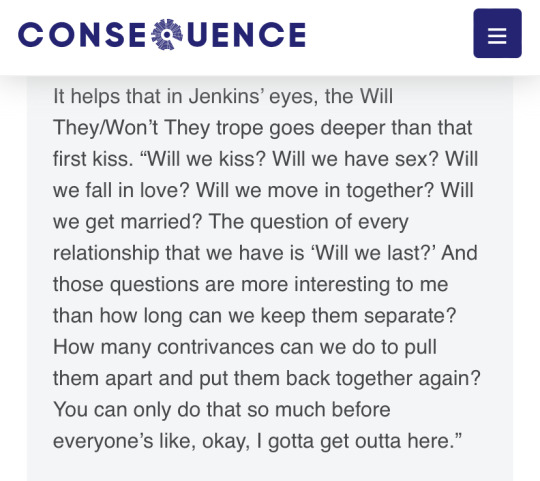
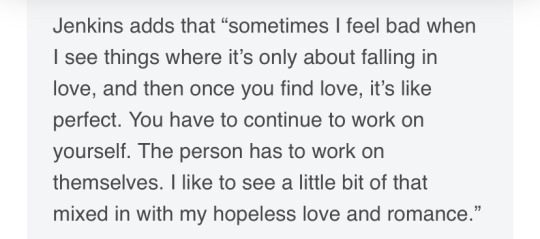
#the excellent meta i just reblogged reminded me that i meant to post this quote!#our flag means death#ofmd spoilers#david jenkins
215 notes
·
View notes
Text
I’ve always found it interesting that of the lowborn/bastard women in the DotD, Marilda is the only one who doesn’t get slandered and insulted in the Westerosi history books.
Speaking specifically about the women who were rumored to have had affairs with noblemen, the women (Sara Snow/Alys Rivers/Nettles) in particular get derogatory descriptions for various reasons. The men they are linked to all either die or are unable to do anything about the rumors (Sara: her rumored lover Jace dies and her brother Cregan is far away in the North when those rumors become a thing in the South years later/Alys: her rumored lover Aemond dies and her son is obviously too young to do anything about the insults people are saying about his mother/Nettles: her rumored lover Daemon dies). Regardless of whether any of the rumors were true or not, it's still the women in the relationships who were described in a negative manner. Even men like Aemond or Daemon don't get as slandered, despite their more controversial actions.
Sara may or may not have existed (the fact that her existence alone is doubted speaks for itself) but in the history books she is described as an "unwashed" bastard. Even the fact she was a virgin at the time of her affair with Jace is called into question. Alys gets descriptors like "slattern" and "cow". She is reviled as a seductress and witch who would sacrifice her own children. Nettles gets insulted as well, both by characters around her and the maesters/septons recording the histories. Beyond the classism, there is also a racial angle to the insults with her skin colour always being at the forefront when she gets called "dirty" and "creature". It’s unfortunate but Westerosi society is unfair to women, especially those of a lower social class, and so they do often have to rely on the men in their lives, whether that’s a male lover/husband, their father, brother(s) or son(s) as a source of protection. Characters like Sara/Alys/Nettles don't get that protection.
Then you get to Marilda's descriptions in the book, and it's completely clean. Not a single insult is uttered against her despite her supposed involvement with two different Velaryon men. Whether her affair was with Corlys or Laenor, it occurred at the time when they were married men. Laenor is dead by the time when he's claimed to be the father of Marilda's sons. But Corlys is alive and well. Not to mention, he's a very well respected figure in Westerosi society. That being said, I can’t see Corlys doing any major PR control here since he does not have the means to do so.
Alyn, however, could ensure his mother did not get negative remarks. He's the one said to have fostered close ties to the Citadel and a positive relationship with the Faith. On more than one occasion, he was anointed by the High Septon himself, which is something that's typically reserved for the King or his Kingsguard. So I think Alyn might’ve used that influence to his favor.
While Alyn does seem like the type who doesn’t care much about what others think of him, he clearly respects his mother so I doubt he would want her to have a bad reputation. Even concerning the rumors of Alyn's potential affairs, the maesters are somewhat dismissive about them and call the rumors "unreliable". They don't give much credence to what third parties are saying on such matters. As for Alyn's mother, she is spoken of with nothing but respect and even flattery at times.
History is truly written by the victors.
#valyrianscrolls#asoiaf#marilda of hull#alyn velaryon#corlys velaryon#laenor velaryon#sara snow#alys rivers#nettles#alyn & marilda#meta#alyn going from being a mama's boy to a girldad was a very excellent writing decision by grrm
77 notes
·
View notes
Text
Taigen will duel Mizu in London, where unbeknownst to him, you use guns instead of swords in duels… and the rules are very different, such as allowing another to duel in your place. But thanks to Fowler (and having been in London a little longer than Taigen, presumably) Mizu will know this… and chaos will ensue in the least predictable and most entertaining way possible.
#i was inspired by an episode of The Artful Dodger which is also great and you should watch#‘worry not about the duel#🤺🤺🤺#‘i am an excellent swordsman😌’#‘oh thank god 🙄 because its PISTOLS!!! 😤pistols at dawn and he is an EXCELLENT shot!’#‘😦😧’#blue eye samurai#mizu blue eye samurai#bes mizu#taigen blue eye samurai#taigen x mizu#bes taigen#mizu#taigen#blue eye samurai spoilers#mizu x taigen#blue eye samurai headcanons#bes au#blue eye samurai meta#the artful dodger
119 notes
·
View notes
Text
Drinking Preferences in 9-1-1
Quick note: All of this is free from paid product placement because the show doesn’t have the characters interact with/drink real alcohol brands. They only use real brands for set dressing when they aren’t the focus and wouldn’t really be recognizable unless you already know that bottle/label.
So Maddie and Chimney have Grand Marnier and Monopolowa vodka (real brands) sitting out on a bar cart but the one bottle anyone interacts with is the fake brand of Glencallan scotch. The bar Chimney worked at was fully stocked with real brands of vodka (Deep Eddy, Stolichnaya, Tito's, Absolut) but no one actually touches them.

The fake prop brands fall into two categories: totally fake and generic, and lookalikes.
The totally fake brands are things like Glencallan scotch (a mashup of Glenlivet and Macallan) or the piscos behind the bar in Peru. Buck has Meichtry Draft beer in his fridge, which is a common prop beer that other shows use too, and a lot of characters in the show drink the generic Genuine beer.
The lookalikes are things like the beer Buck serves Connor that's called Cerveza Extra but it's written in a similar font to Corona Extra so to the passing glance, it’s recognizable to most people as a real brand they’re familiar with. When Buck and Hen are doing shots, the tequila is Carlos Medina Especial, made to look like Jose Cuervo. (Judging from the bottle shape and back label, Buck and Taylor were also doing shots of a different fake Jose Cuervo.)
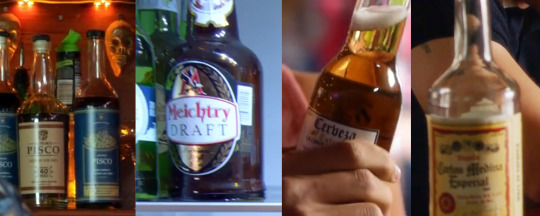
Because they aren’t restrained by product placement, the show can give the characters their own drinking preferences instead of having them all drink the same brand with the clearly visible label conveniently turned towards the camera.
And because I was watching anyway, I kept track of how many times each character drinks what. (Scenes that show them drinking and what they're drinking, not counting up every drink they've had.)
So as of 6x12:
Chimney
Beer: 15 | Wine: 9 | Spirits: 4 | Cocktails: 0
Chimney seems to prefer beer, and he also drinks wine with Maddie pretty often. His go-to spirit appears to be tequila, but he also had scotch while his dad was visiting.
When he’s hanging out, he has a beer or two.
When he's misery-drinking, he has more than two, like when Albert first showed up or when he felt responsible for letting Shannon die.
When shit’s going down that he's not directly involved in, like when the Buckleys were coming or when Karen thought Hen was cheating again, he goes for tequila. It's a fake Don Julio called Señor Suertes.
But when things were really wrong, when Maddie first left and he was falling apart trying to figure out what happened to her, there was no evidence of him drinking at all. The entire apartment was covered in baby stuff.

Maddie
Beer: 2 | Wine: 18 | Spirits: 0 | Cocktails: 0
Maddie almost exclusively drinks wine, and in their new house, she and Chimney have a small, full wine rack on the counter.
She first drinks a beer after dispatch was taken hostage, when both Chim and Buck are also having beer but Josh is having wine. She seems to have another beer at May's graduation party, but everyone's drinks are in plastic cups and look more like juice than their usual prop beverages.
She stops drinking through all of s4 (pregnant) and doesn't seem to have another drink until the balcony with Buck at the end of s5.
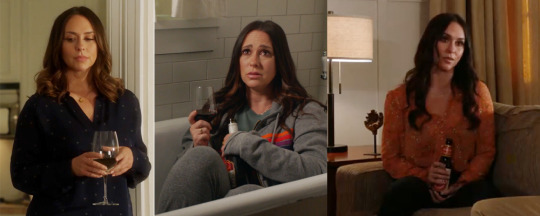
Athena
Beer: 2 | Wine: 26 | Spirits: 4 | Cocktails: 3
Athena drinks the most out of the main characters.
She usually drinks wine, but she'll also go for something stronger, usually when she's out at a bar. She often has a glass of wine with dinner, and seems to favor having one after a rough day. After she slapped Harry, she drank a neat whiskey at home. She's added whiskey to her coffee twice.
But like Chimney, when she's spiraling and obsessively cleaning the entire house after realizing Hudson was in there touching their belongings, she was totally sober.
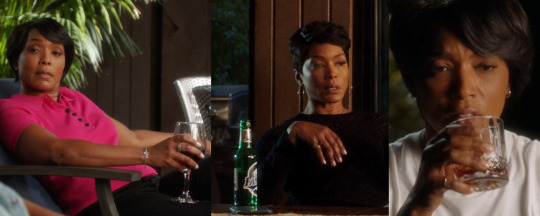
Bobby
Beer: 0 | Wine: 0 | Spirits: 3 | Cocktails: 0 | Club Soda: 2
Obviously Bobby doesn't drink, but when he was struggling with relapsing in Starting Over, he was holding the same prop Glencallan scotch that Chim has. When he did relapse in Worst Day Ever, he was drinking a fake Jack Daniels. In Point of Origin, he was drinking a generic vodka.
(Interesting that he chose a 35 year scotch, which is not cheap, when he previously drank Jack, which is about $25.)
When he's out with people who are drinking, he usually goes for club soda or water.

(The same scotch being used for Bobby, Chim, and Buck could be intentional, but this is also a common fake scotch brand used all over the place, so it could just be that they had it on hand.)
Hen
Beer: 9 | Wine: 11 | Spirits: 1 | Cocktails: 1
Hen is mostly seen drinking beer or wine; beer when she's out at a bar, and usually wine when she's at home or at Athena's. Hen and Karen have a full wine rack in their kitchen (added after s4), but clearly neither one of them will turn down tequila (I like to think it’s Chim’s influence).
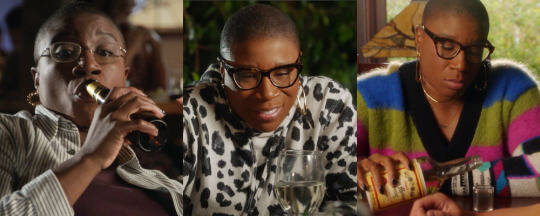
Eddie
Beer: 13 | Wine: 5 | Spirits: 1 | Cocktails: 0
Eddie generally sticks to beer. He's also the one we see drink the least out of everyone who does drink, but Maddie's only one scene ahead of him.
We've seen him drink wine a few times (always red) and he also had a cognac or brandy at dinner with Shannon (judging by the type of glass). But when he's most comfortable and relaxed, having a drink with Buck or the team, he's drinking beer.
We don't see him drinking after a rough day unless he's talking things through with Buck over a beer. If he keeps anything beyond beer in his home, it’s kept out of sight. There was no visible alcohol in his house in Texas either.

Buck
Beer: 12 | Wine: 11 | Spirits: 6 | Cocktails: 2
Buck is pretty evenly split between beer and wine.
He worked as a bartender, but he doesn’t seem to have much interest in alcohol beyond having a drink with other people. This makes me think he wanted to bartend for the social aspect of it, not because he particularly cares about spirits or making cocktails.
Buck also doesn't seem to care about the quality of what he drinks. Chimney's go-to bottle is about $40-50, while Buck's doing shots of bottom shelf tequila with Taylor and Hen, and drinking a full pint glass of watery margarita with Lucy. (This man should stop drinking tequila.)
The first time the Buckleys all have dinner together, Phillip has scotch and Buck has wine, but the second and third times, Buck opts for scotch with his dad. These are the only times we've seen him drink scotch, so I assume he did because his dad did.
The only time we've seen Buck drink alone was while he was depressed after the blood clot, as there were a few empty beer bottles scattered around his kitchen when Eddie showed up, and he was sitting with an empty beer bottle when Eddie and Chris came by after the tsunami.
He has a small wine rack on the kitchen counter that has a few bottles in it, and occasionally there's a wine bottle grouped with the olive oil/other cooking bottles.
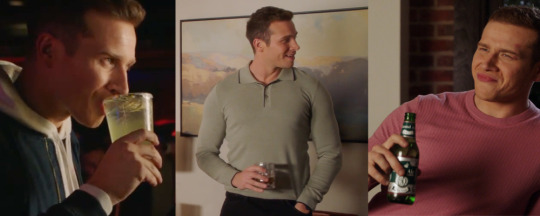
Random Observations:
Buck and Eddie didn't have a beer together on screen until 3x9, the Kitchen Scene.
Athena frequently drinks wine at Bobby's apartment in s2. They keep alcohol in their home (out of sight) and he has no problem pouring wine for others.
I'm pretty sure that the only time we saw Buck drink in all of s1 was (trying) to have a glass of wine on his date with Abby.
Hen and Athena almost always drink wine at each other's houses. I think they only had beers once.
Anyway, I think prop alcohol is really interesting and I have a passion for label design, and this is what I've chosen to do with that. Hopefully I didn't miss too much.
#guys i think eddie might be a lightweight#and his wine nights with karen are in jeopardy#unless she decides to educate him about wine which would be excellent#911 fox#911#911 meta
406 notes
·
View notes
Text
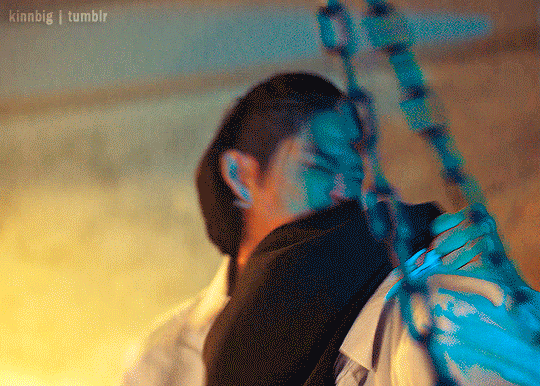
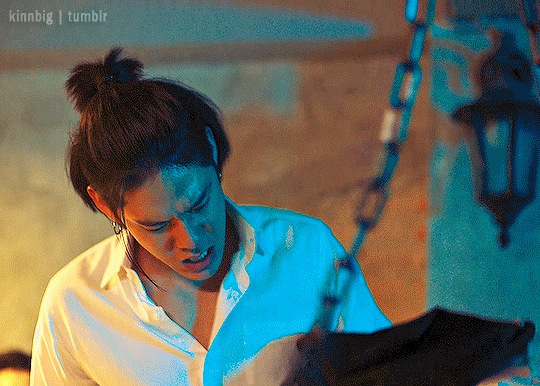
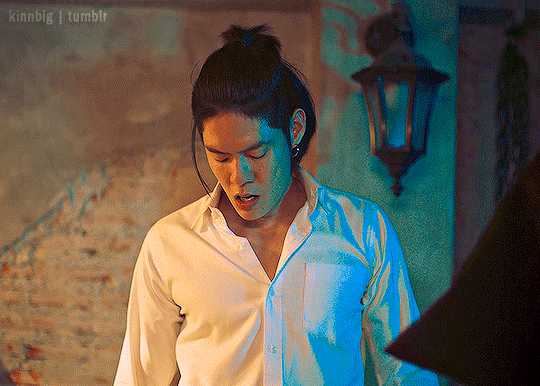
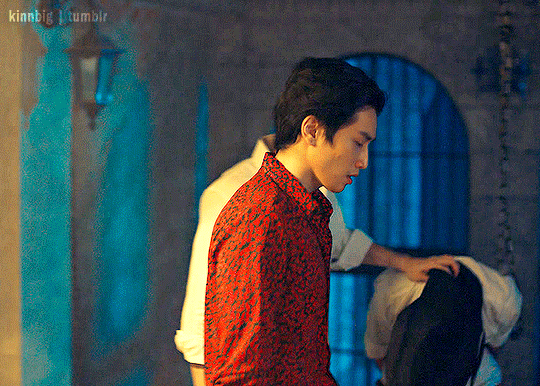
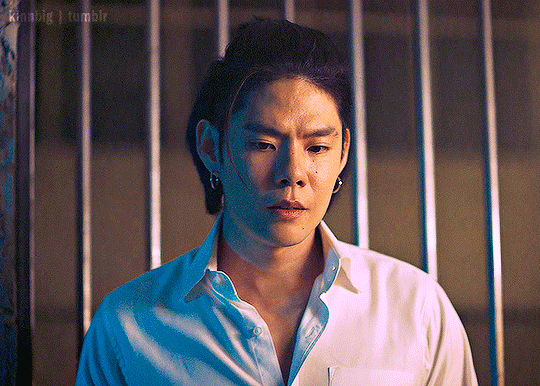
"are you going to talk or not?"
KP Anniversary | Underrated Moments [3/?]
#i just think big should have been allowed to just go feral and beat the shit out of more people on screen!!#ik this scene in general is not underrated there are many excellent gifs/fics/meta about vegas and pete in this scene#but not enough love for BIG MY BESTIE BIG#he is sooo angy and sooo pretty!#kinnporsche#kinnporsche the series#big kinnporsche#big kp#nodt nutthasid#kpappreciation#kpanniversary#kinnporschesource#darcey.gif#darcey.txt#kinnporsche.gif#bl.gif#asiandramasource#uservik#taggingmarion
297 notes
·
View notes
Text
One thing I am absolutely never normal about is the psychology of characters in media I am also not normal about and how it's portrayed, what mental conditions they may have based on the symptoms they exhibit, etc, especially if it's impactful to their character and the story. I find it very intriguing to them, not just as characters, but as people.
With that said, I just got into RDR2 (five years late, I know) and man... Dutch Van der Linde I am going to grab you by the collar and toss you onto my inspection table and microscope, you are a whole ass STUDY!!!
#ranna word dumping#benjamin byron davis played so excellently as dutch ugh!!!#i'm still unsure what condition dutch may have#maybe bpd?? narcissism???? bipolar???????#might make a meta post when i decide#dutch is such an interesting case when it comes to his psychology and mentality#i'm being fed tonight!!!#rdr#rdr2#red dead redemption#red dead redemption 2#dutch van der linde#arthur morgan#john marston#javier escuella#bill williamson#sadie adler#sean macguire#kieran duffy#lenny summers#character study#character analysis#meta
143 notes
·
View notes
Note
You listened to the Superman radio show? Cool! :D I must ask, what did you think of the original Clan of the Fiery Cross arc? How do you think it compares to Superman Smashes the Klan?
Yes! I believe that Superman Smashes the Klan improves on the original Clan of the Fiery Cross radio show arc in just about every possible way! Still, I was pleasantly delighted by how biting the original radio arc was (I listened to it in anticipation for the graphic novel)- it's no wonder that some of the lines were lifted directly into Smashes the Klan.
The main difference between Clan of the Fiery Cross and Smashes the Klan is who is centered in the narrative. In the radio show, while it did tackle anti-Asian racism directly, it was still focused on the white characters' feelings and opinions about it. Superman teams up with Chuck Riggs while Tommy Lee and his family are essentially anecdotes, narratively. I think they barely had speaking lines. The white characters are characterized as either "good eggs or bad eggs": the Clan are deplorable people and all the other white characters are critical of them. Chuck's mom does a raving condemnation of them to make this clear.
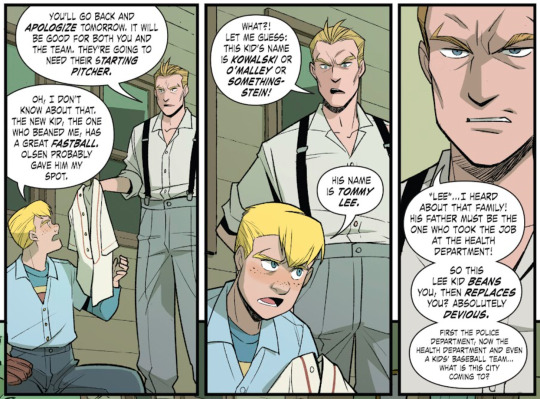
Meanwhile in Smashes the Klan, the story centers the Chinese American family. Roberta- a character who was only mentioned once is now the main character and heart of the story! All the characters are complex- Tommy makes racist jokes in order to fit in, their dad desperately wants to assimilate through anti-Blackness, etc. Racism is shown as a systemic issue that affects everyone. Instead of white people being either racist or not, it's shown regardless of their opinion that they all benefit from a racist system. Chuck's mom still criticizes the Clan "but is it really all that bad to want to live among only your kind?" and Chuck repeats this notion when talking to Tommy. All in a very accessible language for kids to understand. And of course, Superman relating directly to Roberta's family as a character instead of being just A Force Of Good Who Fixes Things. The climax in Smashes the Klan is a lot stronger too.
Still, the Clan of the Fiery Cross arc is absolutely worth a listen. It's an important piece of history! It has a lot of misinformation spread about it that's so easily debunked by just listening to it. Great performances, I can see why it was so popular! It's still way more political than most Superman media nowadays. Very fun to compare the graphic novel to it.
#askjesncin#media criticism#maws- take notes. this is how you write a character with replacement theory fears. u cowards.#ppl like to essentialize diverse talent- like gene yang doesn't just add depth to the asian characters. He added depth to everyone#and strengthened the overall themes because he is an excellent writer. WRAGH!!!#this is a superman smashes the klan supremacy blog#jesncin dc meta
59 notes
·
View notes
Text
Me dejó.
After the initial excitement I got from the scene in which q!Roier talked about q!Cellbit to Pepito where he told him that he is also his father and that, despite the circumstances, he has faith that he is still alive, I noticed something (and I saw that other people also noticed): he never mentioned that he had hopes that q!Cellbit will return to the island.
At first I thought it was just that maybe it was implicit in the fact that he had faith that he was well and that he would see him again, but my illusions fell apart after he told Pepito that he "loved" q!Cellbit, conjugating in the past tense. Then it fell like a bucket of cold water, he didn't say it that way because he doesn't feel that love anymore (q!Roier loves q!Cellbit with all his heart) but because he doesn't want that by accepting that he still loves him, that love will become a force against q!Cellbit's decision.
I remembered then that it is not the first time q!Roier does something similar: keeping his feelings to himself to respect q!Cellbit's decision, when he saw him agreeing to marry q!Quackity during Festa Junina's fake weddings, he had already made it clear: I care for your happiness.
q!Roier has listened over and over again to "Que lloro" by Sin Bandera where one of the verses says: "Ya lo entendí, no eres para mí" (I got it, you're not for me).
The negotiation phase of q!Roier's mourning did not focus on holding on to the hope that they will meet again. For q!Roier, it is enough that q!Cellbit is alive.
Because that's all he can do with the limited, almost zero, information he has. It's the only thing he can negotiate: On a hellish island, thousands of miles away from him, without the slightest intention of returning, but alive.
Yes, he had promised to go after him if someone took him away against his will again, but what should or could he do if the one who chose to leave was q!Cellbit himself?, would he still want his husband to find him?
Didn't q!Cellbit himself say "together until the end" before they were thrown into purgatory? Roier ran to the ship with that in mind, credulously thinking that they would meet there after the earthquake and face whatever was next together.
After searching for him inside the ship he realized that q!Cellbit was not there, he began to ask for him more than once. He received no answer. q!Cellbit did not want him to go looking for him. We know it was to protect him. We know it, but q!Roier does not.
Then anger arises, a feeling proper to mourning, the "he left me, he abandoned me". It is not an anger born of hatred. It is an anger born of genuine pain from a wounded love. It IS NOT AND NEVER WILL BE intended to make q!Cellbit a villain in his argument or to invalidate the many, many reasons he may have had for deciding to stay on an island a million times worse than Quesadilla because they are all weighty, they are all justified but, why should q!Roier have to assimilate them just like that without being able to get angry even for a moment? He only knows that he was thrown back into loneliness, thrown by the one who swore to him in his wedding vows that he would never live anything like that again. And even if it was with every intention of saving his life that can't help that it hurts. It can't help but make him feel left out.
It is a natural response that he HAS A RIGHT to as he sees the love of his life left behind, with a high probability of dying, while he is left with no choice but to pick up the pieces that are left of him while everyone, and even his own husband, hopes that one way or another he will manage to move on.
He has the right to because q!Roier, above all else, is only a human, a human who has suffered, who has been betrayed, humiliated and stripped again and again of the people he loves. Seeing how when he seems to finally have happiness in his hands, it slips through his fingers like water. Boiling water that leaves his skin scalded.
#qsmp#guapoduo#spiderbit#qsmp roier#qsmp cellbit#q!roier#q!cellbit#roier qsmp#cellbit qsmp#just a guapoduoshipper: analysis#In Meta reasons cc!Roier is doing an excellent job to give cc!Cellbit space for his projects without pressuring him.#BUT IT HURTS LIKE HELL
93 notes
·
View notes
Text
its understandable that people characterize elias as a stereotypical annoying bitch disney villain, but i feel like the canon was trying to do something so much funnier with him. his main personality trait was never being petty or overtly evil. it was being boring and corporate. this is not loki, this is like. the narrator from the stanley parable. ok. this is mr. does budgeting for fun. he is an automatically generated manager who just so happens to be a 200 year old evil false prophet.
#the three things we as a fandom fucked up:#1. making elias a stereotypical charming flamboyant villain when really he's the boringest guy ever#2. making martin a morally pure soft boy when really he's an excellent example of trope subversion#3. making gertrude a grandmother figure when she's a single old woman with no family. she's perfect how could we do this to her#im probably guilty of all of these at least once too but trying to be better#tma#the magnus archives#elias bouchard#jonah magnus#tma meta#tma analysis
106 notes
·
View notes
Text
Reasons not to be a lighthouse
So, I want to talk about the lighthouse, and what it means for Stede to be the lighthouse.
I’ve seen fanart that frames the lighthouse/kraken imagery in a light vs dark, oppositional way. Like Stede is a light that needs to rescue Ed from the dark. And jarring with that use of the imagery made me realise that I see these symbols completely differently, not in opposition but in parallel. To me it follows that if the kraken is Ed at his worst, then the lighthouse is Stede at his worst.
It’s easy to see the negative attributes of a kraken (frightening, violent), but the negative attributes of a lighthouse are less straightforward (yes, you can get smashed on the rocks, but what exactly does that tell us about Stede?).
When I considered it, it brought to mind the apocryphal tale where two nations are in contact by radio at sea. They each demand the other divert to avoid collision, going back and forth until one country says “This is the biggest, most heavily armed warship in our country’s big and heavily armed fleet. We demand that you divert course or we will fire upon you,” at which point the other country says “This is a lighthouse. Your call.”
A lighthouse is not going to divert course to avoid a collision. It’s going to stay exactly where it is, and if you don’t divert course to accommodate for it, you’re fucked. A lighthouse is a perfect metaphor for obstinance, for inflexibility. Stede can be bad at taking other people’s perspectives into account and adjusting accordingly. At his worst, he can’t even take in that other people’s perspectives may differ from his in the first place.
We see this with his family. He wants to uproot their lives and go to sea. He presents his dream as a present to Mary, and assumes she will be just as thrilled as he is, because he’s too wrapped up in his own excitement to connect with Mary as a separate individual. The dialogue then explicitly tells us how Stede is unwilling/unable to hear Mary expressing her perspective/experience:
Mary: "You know I hate the ocean. I said so just the other day."
Stede: "What? When?"
Mary: "When we were standing by the fucking ocean."
Mary isn’t upset that Stede has an interest in sailing, she is upset that Stede has no interest in actually knowing her, merely trying to fit her into his own interests. The scene where Mary repeatedly tries to get Stede’s attention and he ‘Mmm’s without looking up from his book also show us how he does not respond to her attempts to communicate. It’s telling that when she presents her anniversary present to him, Stede does not know Mary paints. (Honestly, I would find it completely in character for Stede if she had mentioned her painting to him several times in the past, but he just hadn’t taken it in because it’s not what he’s interested in.)
Which takes us to the consequence of this inflexibility: the lighthouse is isolated. Stede is so inflexible at times that he cannot forge the back-and-forth communication required to actually connect with other humans.
We also see this at the start of the show with his crew. I think the underlying reason that the crew wants to mutiny is how Stede cannot see things from their perspectives or accomodate for them.
Stede went into piracy with no experience, and decided to impose his own views on how to do things on his crew, without seeking to first learn from them about an area in which he has no experience. Throughout the first few episodes we see Stede trying to push his crew into being the people he expects and wants them to be, rather than trying to get to know them.
In the first episode, in the ‘talk it through as crew’ call and response, we see Stede (frankly, quite patronisingly) trying to push the crew into adopting his perspective and participate the way he wants them to. We hear Stede narrate "I pay my crew a salary. Same wage, every week, no matter what. Course, it took them a while to come 'round to the idea", and while Stede probably thinks he’s doing what’s best for them and they just can’t understand that, consider what difference it makes to the power dynamics if the results of everyone’s work are shared versus if they are completely dependant on Stede. Consider how Stede is disbelieving when Lucius says he’s the only crew member who can read ("That's not. Is that true?"), dismissing this input to the point that a couple of episodes later, when he tries to replace Lucius with Frenchie, he is surprised to discover Frenchie cannot write.
When Stede decides that the crew should vacation in episode two, he says explicitly "Your time is yours to do with as you please" and "There's literally no way to mess this up." He then almost immediately starts telling the crew what they can and can’t do, responding to their methods of unwinding with "That is NOT what I was talking about!". You’re not allowed to spend your downtime roughhousing, becasue Stede does not enjoy roughhousing. Stede’s preconception of himself as a captain is that he is accepting and he listens, but the actuality of his captaining style is that he tries to push his crew into complying with his preferences.
In the third episode, Stede is completely unwilling to learn from his crew – most of whom have visited the Pirate Republic before – about how things work there. When Lucius tries to advise him (repeatedly) he dismisses it (repeatedly).
If the kraken represents a toxic masculinity aligned with aggressive and threatening behaviour, then the lighthouse represents a toxic masculinity aligned with is mansplaining, blind confidence and the assumption of authority.
In episode four, their meeting starts Stede and Ed’s arc of mutual character development. I think it’s a crucial moment in Stede’s development when he excitedly presents Ed with Stede’s preconception of who Ed is – a picture of Blackbeard from one of his pirate books – and Stede actually sees and takes in Ed’s response. Stede listens to Ed. And after having listened, Stede adjusts his course. While Stede’s perspective is firmly that being Blackbeard would be great (he says that he’d give up everything for just a day of being Blackbeard), what he says to Ed isn’t encouragement to keep going, insisting that surely Ed’s life is amazing. Instead, it’s: "Look. I can't believe I'm saying this, but have you ever considered retirement?" This might be the first moment in the show where Stede is considering things from someone else’s perspective. And that’s the start of him being able to reach past his previous isolation and actually connect.
Stede still struggles at times with seeing past himself for the rest of the show, but episode four is a turning point. It introduces his capacity to change and a new willingness to learn.
For the rest of the show, we see Stede succeed when he stops trying to be the isolated beacon that gives detached direction, when he can see past his preconceptions, connect and adjust, and we see him fail when he can’t. In episode five his moment of triumph is rooted in a moment of connecting with and listening to Frenchie. When Frenchie expresses his experience – “I was in service for a minute so I now the lay of the land and trust me, servants, they see everything. This lot, they're not so fancy” – Stede actually takes it in, and that gives him the idea to ask Abshir for the information that Stede builds into his passive aggression bomb. In episode six Stede comes pretty close to explicitly naming the problem and solution himself: "I'd like to apologise for my behaviour earlier. As total as my theatrical knowledge may be, I did forget the most important thing: company!"
I think what takes the crew from where they started at the brink of mutiny, to the intense loyalty they have by the end, is not a change of heart on their part, but Stede changing. Stede softening his dismissive streak, starting to genuinely rather than superficially listen to his crew and to respect their input.
When Stede feels he needs to be the lighthouse, he feels he must be the guiding light all on his own. He can’t have his guidance questioned, because then he’s failing in his role.
I think this sense that ‘knowing best’ is supposed to fall entirely to him is one of the reasons why he feels so guilty about leaving Mary: he is supposed to be her guiding light, so surely without him she must be lost? Surely, without his light, his family have been smashed up against the rocks? It is his sense that he has failed in his duties at being his family’s lighthouse that makes him falter at the crucial moment when he leaves Ed. Stede seeing that actually, his family are just fine at finding their own direction (and Stede finally, finally, listening to and allowing himself to be changed by Mary) is what shows him that he doesn’t have to be the lighthouse.
I don’t think he returns to his crew as a guiding light. I think he returns ready to adjust course as he goes, with his crew’s support and collaboration.
#ofmd meta#stede bonnet#our flag means death#ofmd#I was going to add another section about how Ed is the counterpoint to this#how (as others have explored in excellent meta) Ed is too flexible to others in contrast with Stede not being flexible enough#and how I understand that with the overall lighthouse/kraken symbolism#but I think that might be a whole other meta because this is already pretty long#my ofmd meta
2K notes
·
View notes
Text
Misaki Unasaka - Old Habits Dying Hard - BD - E10 - SPOILERS
I like Misaki as a character. I like the complexity of her character, and I’m glad to see that the reason they had her come back for Miri was because of a truly life altering situation like cancer.

I don’t wish ill on her (I saw a tweet over on Twitter that was basically saying they hoped the cancer killed her). She hit rock bottom, or hit the end of the sea, as the name Unasaka can mean. The kanji for sea also has the kanji of “regret” making up a part of it:

And I do think that we are seeing Misaki expressing regret here. Addicts, people stuck in abusive relationships, and other such situations, often don’t realize how bad things have gotten until they are at their absolute worst. That’s what’s happened to Misaki here. She’s trying for a fresh start:
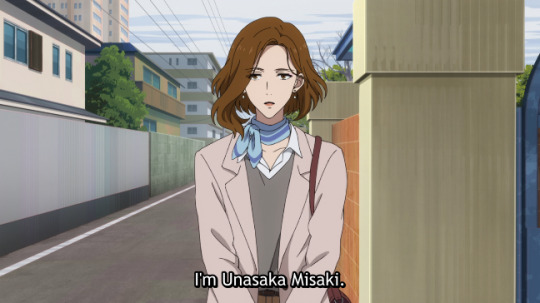
A hair cut, new set of clothes, and wanting Miri back in her life.
I do think that she’s coming from a good intentioned place, and for wanting what’s best for Miri. But, some things are still feeling off, but not in a “she’s evil and wants to ruin them” kinda way, more in a “I don’t know if Misaki will be able to break out of bad habits that will end up harming her, her relationship with Miri, and Miri.”
When Kazuki met Misaki, she was at the end of her rope and most definitely burned out. Now, Misaki has had a year without Miri, so seeing Miri again and interacting with her can be viewed as easier, especially since she seems to want to try and due right by Miri this time. But she still seems to be floating, she mentions living with her parents, but then Rei brings up the Christmas show coming up at the daycare, so she states she’ll rent an apartment.
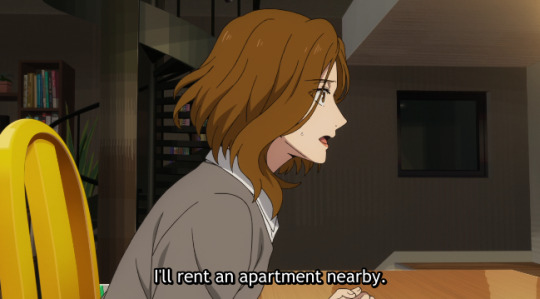
She lost her job and “her man,” but hasn’t stated what her new source of income is yet. And while she seemed comfortable enough in the kitchen, and Miri is nothing but smiles at seeing her Mama again, the way she interacts with Miri feels more like a visitor than a mother:
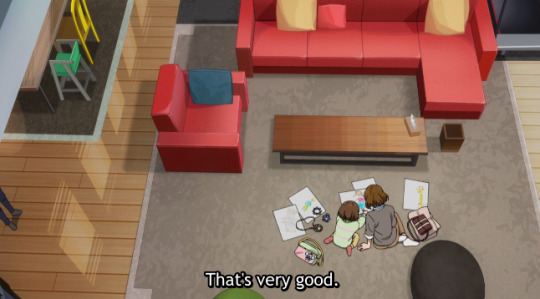
There is a distance there, which could be explained by the one year absence, but not quite. I lived in Japan for six years. I was an adult at the time, but my family experienced a lot of changes at that time. But when I came home for good, it felt like no time had passed at all.
With Misaki, it feels more like a friend of the parents dropping by with the way Miri introduced everything to her. I do like how Misaki’s mother asked Miri her thoughts on who she wanted to live with:

It’s important. She may be young, but her thoughts and feelings on the matter aren’t pointless or useless. That being said, the way Misaki asked it seemed a bit competitive in a way. Or, a better way to say this, is that she might feel a bit inferior here. They were likely able to provide for Miri in a way that she couldn’t. Both her and Kazuki are butting heads here, since they are both trying to fulfill a similar “mother” based role, and both feel a bit threatened in a way. Rei just doesn’t fit into that role, which is why he is able to mediate between the two of them.
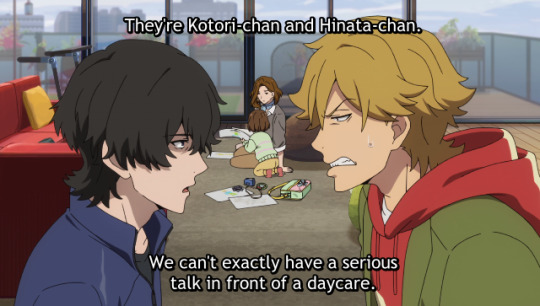
As the end of the episode stands, it seems like Miri is going to go off and live with Misaki. That’s what Kazuki and Rei think, that that Ferris wheel ride was the last time they would be with her. And while that could end up being the case, the series is an anime original, so none of us know what will happen yet...A part of me just don’t think that will end up being the case.
Both Kazuki and Rei have shown that they can grow and change, especially if its for Miri’s sake. They talk a lot about that in the Ferris wheel, and we (the audience) have seen this. But with Misaki, we don’t know yet. We hear her talking about change, we see her physically changing her appearance, but the moment that stands out to me is this one:
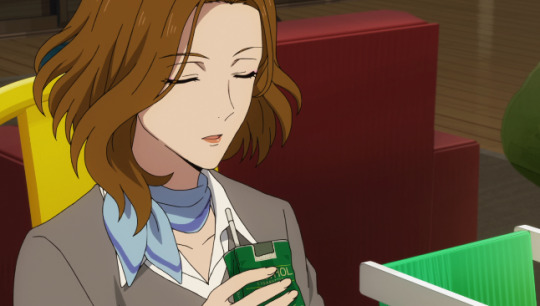
She was reaching for a cig even though she has throat cancer! She likely got that cancer because of smoking, and yet, here she is - smoking still. Rei used to smoke too, but once Miri came into the picture, and after he really started to bond with her and care about her, we haven’t seen him smoking, even at Kyu’s cafe. I think the last time he smoked was back in Episode 4 or something. It’s been ages.
He broke a habit and changed for Miri.
Will Misaki be able to do the same? Or do old habits die hard for her?
I don’t know how, exactly, they are going to chose to wrap this situation up fully. Will they have Misaki pass away due to the cancer, and then have Miri going back to Kazuki and Rei in the end (or would she end up with her grandparents then, since they still seem to be in the picture)? Will Misaki realize that maybe motherhood really is just something that isn’t for her in the end and allow Miri to return to Kazuki and Rei? Or will they go for a “blended family” type of situation?
I don’t know. They could go in a totally different direction as well. We’ll just have to wait and see, which is a scary prospect, I know, but I’m extremely intrigued by the direction they might take things.
#Buddy Daddies#BD#Misaki Unasaka#Miri Unasaka#Rei Suwa#Kazuki Kurusu#BD spoilers#Buddy Daddies spoilers#meta post#analysis#speculation#long post#image heavy post#also#I really like how you can hear#a sort of strain in Misaki's voice#that was some excellent VA work there!#also also!#I am not here for Misaki hate#I get feeling upset about the situation#but all of the adults here are trying to do what they think it best#and safest#for Miri
253 notes
·
View notes
Text
thoughts while rewatching triangle:
mulder is straight bonkers for just sailing the bermuda triangle looking for a ghost ship.
scully's queen anne counterpart is dancing with an older man, no surprise there lol.
scully running around the fbi unhinged, trying to save mulder's ass, is my favorite thing ever. the people in the hallways and elevators all look like they've seen this many times before.
never thought scully had sexual tension with skinner or spender, but i kinda felt it in this ep! (weird to say)
the continuous takes are just so cool.
"because you're the only one who can save this ship" - yeah she is!
mulder and scully running through the hallways holding hands, my beloved.
scully waited a long time before hitting mulder during that kiss. don't blame her though!
skinner just throwing the flowers on the side table lmao.
"but you believed me" -- love the parallel to folie a deux. i feel like i could write an essay on this - scully is the skeptic, but she believes in mulder in any timeline.
and of course, hearing mulder say "i love you" to scully still makes me so happy.
#i liked this episode a lot more than i remember!#still can't believe this was written and directed by CC#it's like he got one excellent episode a season#and then we know how the rest turned out#triangle#the x files#txf meta#my.txf#msr#fox mulder#dana scully#txf
178 notes
·
View notes